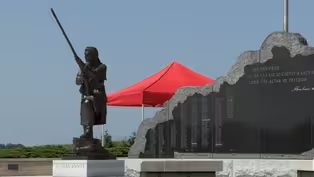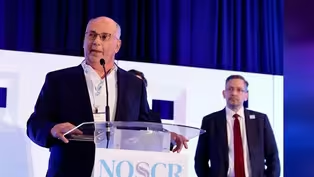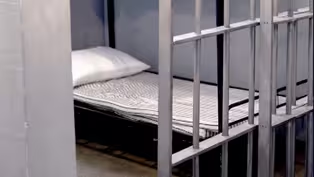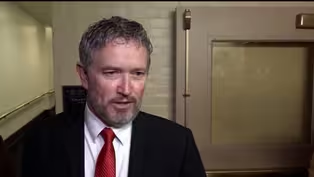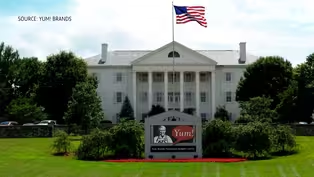
How Israel-Iran War Could Impact Kentuckians
Clip: Season 3 Episode 279 | 6m 4sVideo has Closed Captions
A U.K. professor says Saturday's attack could lead to increased oil prices.
President Donald Trump criticized both Israel and Iran on Tuesday for reportedly violating a cease-fire deal. The deal now seems to be holding, according to a professor with U.K.'s Patterson School of Diplomacy and International Commerce.
Problems playing video? | Closed Captioning Feedback
Problems playing video? | Closed Captioning Feedback
Kentucky Edition is a local public television program presented by KET

How Israel-Iran War Could Impact Kentuckians
Clip: Season 3 Episode 279 | 6m 4sVideo has Closed Captions
President Donald Trump criticized both Israel and Iran on Tuesday for reportedly violating a cease-fire deal. The deal now seems to be holding, according to a professor with U.K.'s Patterson School of Diplomacy and International Commerce.
Problems playing video? | Closed Captioning Feedback
How to Watch Kentucky Edition
Kentucky Edition is available to stream on pbs.org and the free PBS App, available on iPhone, Apple TV, Android TV, Android smartphones, Amazon Fire TV, Amazon Fire Tablet, Roku, Samsung Smart TV, and Vizio.
Providing Support for PBS.org
Learn Moreabout PBS online sponsorshipFirst tonight, the latest from the Middle East after U.S. strikes on Iran Saturday and Israeli strikes that began last week.
This morning, President Donald Trump blasted both Israel and Iran, claiming they both violated the cease fire announced yesterday.
But later, the president said the cease fire appeared to be holding.
Netanyahu says Iran's nuclear program is now in ruins thanks to Israel.
But the Associated Press reports a U.S. intelligence report that says U.S. strikes set back Iran's nuclear program by a few months.
Now, earlier today, we spoke with Doctor Robert Farley with the University of Kentucky's Paterson School of Diplomacy and International Commerce.
He says it appears both sides are now honoring the cease fire.
And he breaks down how exactly this war could impact Kentuckians.
It looks like as of this morning, something seems to be holding that, that the Iranians more or less seem to have agreed, at least implicitly, to the cease fire.
The Israelis seem to be backing away from additional strikes.
And so it does look a bit really, this is not that unusual, right?
It is not atypical for a ceasefire to be broken in its first hours and then people to pull things back together.
Emotions are really high.
People are trying to negotiate.
And that seems like what's happening here, that the president got a little ahead of events in terms of declaring that there was a ceasefire.
But then essentially leveraged that declaration, to put pressure on the Iranians with the threat of more bombing and put pressure on the Israelis with the threat of withdrawing military and financial support in order to get to where we are in terms of the ceasefire.
So yesterday when, the Iranians responded to the attack that we launched on Saturday, they responded by firing ballistic missiles that I believe it's called alluded Air Force Base, in Qatar.
And this is a U.S. facility.
It's been a U.S. facility for a long time.
It was definitely a response to the decision of the United States to strike Iran, Iranian nuclear facilities.
The Iranians gave notice.
And the attack itself was quite small, but the Iranians gave notice indicating that missiles were coming.
And they probably did that because they wanted to convey to the United States, both the U.S. government and the U.S. people, that we are responding symbolically.
Right?
We are, we are intentionally pulling our punch on this strike back because we want this war to end.
And I think you can infer that the Iranians probably have a pretty good sense of what the balance of power here is, that the United States is vastly more powerful, and that the United States could conduct all kinds of attacks across Iran if it wanted to.
And we are trying to very carefully calibrate the diplomacy between the two countries.
And the Iranians are indicating to us that we don't want this fight.
Right.
We will respond.
But this is not a fight that we want to fight.
The deal we were trying to arrive at this time, and the deal we arrived at during the Obama administration, concerned strictly the Iranian nuclear program.
Right.
So it was a deal which was explicitly designed just to arrest the nuclear program.
Right.
It didn't have anything to do with their ballistic missile programs, and it didn't have anything to do with all of the militias that they have trained and funded, around the Middle East.
That's not good enough for Israel, right?
Israel wants some kind of restrictions on the Iranian ballistic missile program, and also wants to disrupt their relationships with the Houthis and Hezbollah and Hamas and all these militias.
And this deal, the negotiations between the Trump administration and Iran were never going to arrive at that.
And so I think it's one of the big reasons that we got an attack.
So the question of whether Iran is going to continue to pursue a nuclear weapon, or it's going to come to some sort of arrangement with the United States and with Israel.
I mean, it's a pretty complicated one, but it's also it's not either or, when people talk about the kind of deal that we want to make with Iran.
I mean, that's a question that made sense two weeks ago.
When the United States and Iran had been negotiating, we were very close on the terms.
The terms were very similar to a deal that we had already struck, back during the Obama administration, it was called the Iran deal or the JCPoA.
And it was a deal that was supposed to basically arrest the Iranian nuclear program.
Iran would have certain rights.
We were really close to getting back into that before.
Two weeks ago.
I am not sure now what the content of any deal would be between the United States and Iran.
We have blown up the things that were really problematic, the enrichment facilities and some of the other stuff.
Iran already has all of the other equipment, human expertise and so forth that it needs in order to pursue a small number of bombs.
Right.
People estimate somewhere between 8 and 10, weapons, that they have enough material for that.
So I don't think it's impossible that Iran will try to do both at the same time.
They'll try to come to some kind of agreement with the United States.
The details of that are pretty unclear.
While at the same time devoting a lot more effort to, attempting to to sort of jump that last, chasm and actually build the nuclear weapons that it wants to have.
How does this matter for Kentucky?
I mean, there are a couple ways.
One is the economic effects.
So thus far, the Iranians have not decided to shut down the Straits of Hormuz, which is where a lot of the world's oil goes through.
We don't buy oil that goes through the Straits of Hormuz in the United States, but if there's any kind of disruption, it will affect oil prices globally, which means that gas will get more expensive here in Kentucky, if prices stay up for a longer period of time than it will, it will wreak more changes in Kentucky's economy.
The other thing is that the, the economy of Kentucky is, pretty substantially invested in the defense industrial base.
We make a lot of aerospace stuff here in Kentucky.
And so whenever there's anything like an air power campaign, airstrikes like this, we in Kentucky should be paying attention because there are a lot of firms around here that make the parts that go into those planes.
And, it does concern how our economy functions.
Kentucky National Guard Celebrates 233rd Birthday
Video has Closed Captions
Clip: S3 Ep279 | 2m 44s | A section of U.S. Highway 127 was renamed during the ceremony. (2m 44s)
Ned Pillersdorf Says He's Running for Congress
Video has Closed Captions
Clip: S3 Ep279 | 43s | The Eastern Kentucky attorney says he'll seek the Democratic nomination. (43s)
Trump Administration Seeks Rescission for Planned Letcher Co. Prison
Video has Closed Captions
Clip: S3 Ep279 | 59s | Congressman Hal Rogers said the prison would bring hundreds of much-needed jobs to the region. (59s)
Trump Says He'll Support Opponent to Massie
Video has Closed Captions
Clip: S3 Ep279 | 49s | The comment came following Massie's criticism of the U.S. attack on Iran. (49s)
Yum! Brands Donates Headquarters to JCPS
Video has Closed Captions
Clip: S3 Ep279 | 3m 33s | Pollio says he'll recommend the district's central office be moved to the well-known location. (3m 33s)
Providing Support for PBS.org
Learn Moreabout PBS online sponsorship
- News and Public Affairs

Top journalists deliver compelling original analysis of the hour's headlines.

- News and Public Affairs

FRONTLINE is investigative journalism that questions, explains and changes our world.












Support for PBS provided by:
Kentucky Edition is a local public television program presented by KET
